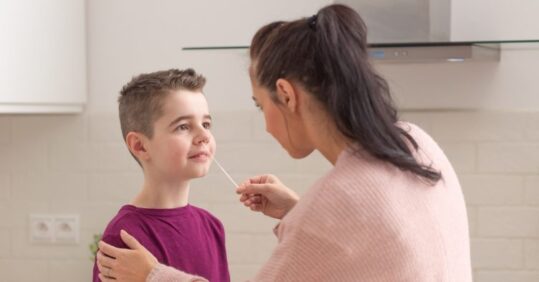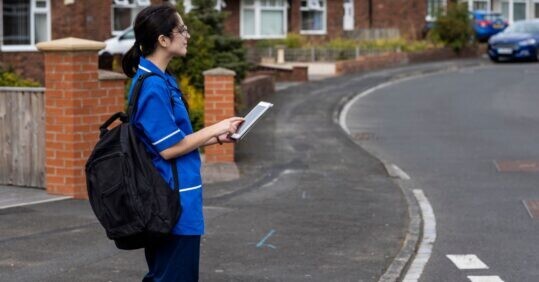Parent-collected nasal swabs would ‘greatly reduce burden’ for community nurses

Nose swabs taken by parents to detect common respiratory illnesses in children are as good as those taken by nurses, according to a study at the University of Bristol.
The research, published in Microbiology Spectrum, highlights the benefits and convenience of parent collected nasal swabs for detecting Respiratory Tract Infections (RTIs) in children.
Related Article: QICN bids farewell to Dr Crystal Oldman as she retires from CEO role
Respiratory illnesses such as coughs, colds and flu, and more recently, Covid-19, can be confirmed by collecting cells from the lining of the nose. Parents taking nasal swabs from their children were found to collect a higher number of cells in comparison to the nurses. However, saliva swabs taken by parents were not as effective at detecting respiratory microbes as those taken by nurses.
The study involved over 300 parents and 485 children of approximately five years of age showing symptoms of RTIs. All participants were from the Bristol area, and the research took place before the Covid-19 pandemic. Swab samples were taken by a parent and a nurse on the same day at home and sent to a clinical laboratory to test for over 40 common respiratory pathogens.
Nasal swabs collected by parents compared well to nurse collected samples, with an agreement of 91.6% when picking up viral infections and 91.4% for bacterial infection. Saliva samples collected by parents did not perform as well, with only 69% agreement for viral infections and 78.1% for bacterial infections when compared with nurse collected samples.
Related Article: England’s domestic supply of learning disability nurses projected to end by 2028
Alastair Hay, a GP and Professor of Primary Care Research at the University of Bristol, who was involved in the study, said: ‘Given the widespread use of nasal swabbing throughout the Covid-19 pandemic, this study has highlighted the suitability, benefits and convenience of parent-collected swabs for subsequent identification of respiratory microbes.’
Parents should be confident about collecting nose swabs from their child for any common respiratory infection, including Covid-19, according to lead author Dr Claire Woodall and an epidemiologist from the University of Bristol.
Related Article: Not enough specialist nurses to provide palliative care in rural communities
Dr Woodall said: ‘In fact, our study showed that parents collected a higher number of human cells on the nose swabs compared to the nurses, which suggests that children are more tolerant of a parent performing the swabbing technique.’
The researchers suggest a low cost, easy to collect kits for home testing of RTIs should be considered, stating that nasal sampling by parents for RTIs in children would ‘greatly reduce the burden on community nurses without reducing the effectiveness of diagnoses’.

See how our symptom tool can help you make better sense of patient presentations
Click here to search a symptom




